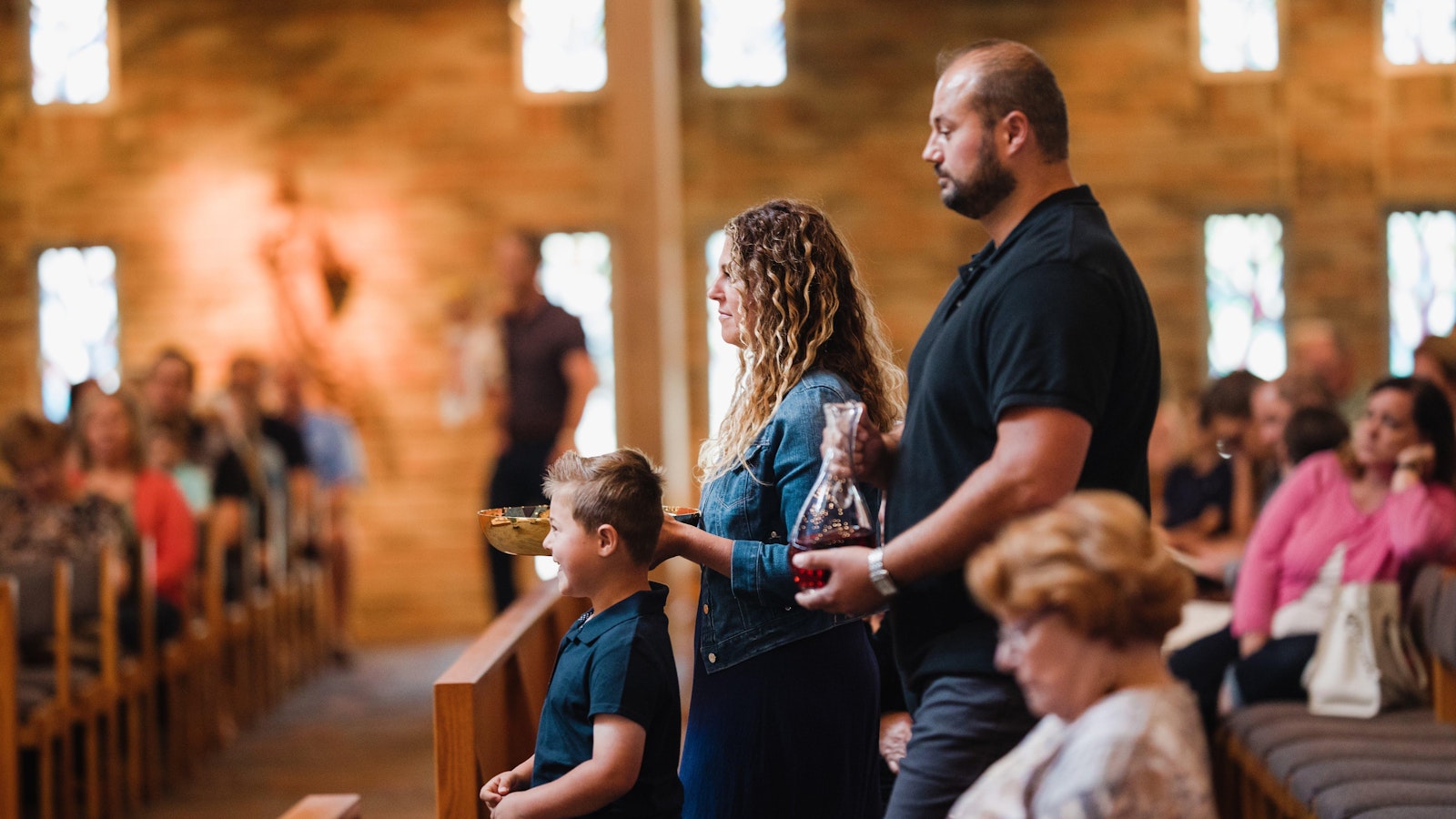
Families are at the very heart of our archdiocesan efforts to unleash the Gospel, because they are the first and most important setting in which evangelization takes place. St. John Paul II once said, “As the family goes, so goes the nation, and so goes the whole world in which we live.” Families are the building blocks of society — and most certainly the Body of Christ. The term “domestic church” is used to describe the family’s mission and purpose. The domestic Church does on a small scale what the Church universal does on a large scale: it makes disciples.
Today’s families face numerous challenges that make it hard for them to live as a domestic church. Aside from the busyness of modern life, today’s secular culture has a tremendous influence on family life. Over the last few decades, we have observed secularization in media, government, education, science, and entertainment. It is the air that we breathe, and it is a powerful influence to combat when trying to raise a Christian family. When we look outside our faith communities and consider the neighborhoods in which we live, it is rare to find families who go to church and make their faith life a priority. Catholic kids find that few of their friends have any kind of faith experience. This is even more pronounced when they go to college.
As a result, we have an urgent duty to minister to families. That is why Unleash the Gospel calls parishes to make it their first priority to assist families to live as a domestic church. This is the whole focus of the Family Ministry Mission Direct area. This Mission Direct area has two primary goals: 1) to oversee ministries that help build and support the domestic church, and 2) to assist struggling families. These goals are accomplished through Marriage Ministry, Family Ministry, Infant Baptism, Family Support Groups, and Childcare.
Marriage Ministry
Any builder will tell you how crucial it is to have a solid foundation when building a home; a mistake in the foundation will only get worse as construction continues. The same is true for the family. A healthy marriage serves as a solid foundation for family faith life. That is why marriage ministry is expanded in the Mission Direct structure. The vision for marriage ministry is to expand it beyond marriage prep to also include marriage enrichment, marriage support, marriage recovery, and divorce recovery. The hope is that solid marriage preparation and marriage enrichment can prevent couples from drifting into avoidable struggles or progressing toward separation or divorce.
Family Ministry
The Family Ministry Coordinator’s work complements the Marriage Ministry work. If marriage is the foundation of a house, family faith is the framing that gives the house its shape. Family Ministry is primarily oriented toward nurturing the faith life of parents so that they can disciple their children. The commitment to live as a domestic church requires parents to be “all in.” Therefore, the process of equipping families to live as a domestic church must begin with evangelizing parents and helping them to grow as disciples. Many parishes have family faith formation programs, but there are many other areas of family life that need support and nurture. Workshops on topics such as Christian parenting, cultivating vocations in the home, having tough talks with teens, internet safety, guarding against pornography, etc. can really strengthen parents in their vocation and help them in guiding their children. These are very important topics, and until now, we haven’t had dedicated staff to support these areas of Christian life, but this new Mission Direct area now gives us that opportunity, and our families will be better off for it.
Infant Baptism
The Infant Baptism Coordinator also has an important role in this area of Mission Direct. As couples begin to welcome children into their families, we have the opportunity to help parents embrace their role as spiritual guides. Infant Baptism is a prime opportunity to not only provide sacramental preparation, but also to work together with the Evangelization Coordinator to provide evangelization opportunities for parents and workshops on the domestic church. If a couple begins the path of intentional discipleship in these early stages of family life, then they will be better equipped to disciple their children when they are older.
When considering ministry to families, providing childcare is the key to successful family programming. In all of our benchmarking studies, we have discovered that this is an essential element that enables parents to engage in parish life. Providing childcare is more than just babysitting; it is an opportunity for the children to encounter Christ and grow in faith through activities, music, caring volunteers, and more.
Family Support
Last, in Marker 7.2, Unleash the Gospel calls us to care for and assist struggling families. The Family Support Group Coordinator is responsible for this work. This person should be available to meet with families, listen to their needs, and offer support, referrals, and resources as needed; they’ll also train volunteers to do the same. This person also organizes support groups for various needs – for example, groups for widows/widowers, families with special needs, and blended families. The Family Support Group Coordinator may also provide workshops for various needs such as care for aging parents, funeral planning, living wills, end-of-life issues, job loss, etc. This position works closely with the Director of Evangelical Charity to provide support as needed.
It will be the responsibility of the Director of Family Ministry to not only oversee these individual ministries, but to provide strategic direction to the integration of these ministries into the Family of Parishes. It will involve not only working closely with the Director of Engagement and the Director of Discipleship Formation, but also working closely with families to understand their needs and adjust programming as necessary in order to build up the domestic church.
As Families of Parishes begin to take shape, it will take some time and planning to build this Mission Direct area to reach its full potential. Families of Parishes may consider combining some of the above coordinator roles into one staff position. The success and fruitfulness of these ministry areas will depend first on the guidance of the Holy Spirit, and second, on the combined efforts of paid staff and volunteers. As we think about staffing and support, we need to reach out to the faithful and into our communities to call forth those who have gifts and talents to work in these areas. Many of our faithful are standing on the sidelines waiting to be asked to get into the game. Many of them would gladly volunteer their time to help the Church.
“As the family goes, so goes the nation, and so goes the whole world in which we live.” Perhaps here in Southeast Michigan, we can reverse the secularization of our culture and begin a “re-Christianization” of our culture, one family at a time.







